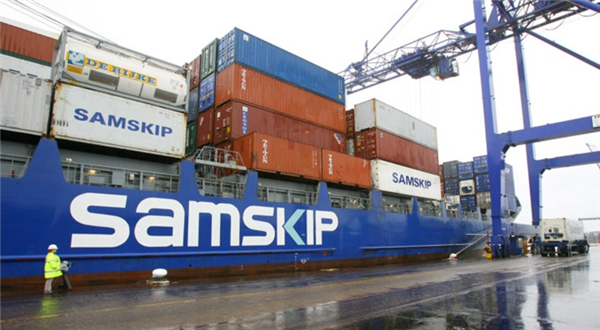Haulage bottlenecks bring relief to Europe’s multimodal operators
Samskip’s chief commercial officer says road and ferry restrictions have led to a distinct modal shift across Europe’s freight network, as shippers vie to fulfill cargo consignments
EUROPE’S shippers are increasingly turning to other modes of container transportation to ensure the continents’ goods continue to flow at a time when the coronavirus pandemic is putting a major strain on haulage.
The slowdown of cross-continental trade on businesses, including Samskip, has been compensated in part by a definitive uptick of localised trade, which has come as a result of a shift in the modal balance in European transport.
The pan-European shortsea and multimodal’s chief commercial officer Jérôme Feuvrier told Lloyd’s List that more shippers are looking at the alternatives offered by rail, shortsea and barge as a necessity.
Such a shift has been hugely beneficial to Samskip, which transports around 850,000 teu each year, and other multimodal operators.
The health crisis has led to major bottlenecks for European road freight because of border controls and stringent medical checks on drivers, while ferry and ro-pax services have been suspended due to travel restrictions. Such has been the extent of the impact on ferry operators, many, including the bigger players, have sought government aid to stay afloat.
While Mr Feuvrier concedes that Samskip has not been immune to the volume downturn at the hands of the coronavirus, by offering a ‘through-transport concept’ unhindered by borders and checks, the group’s shortsea, rail and barge services have sparked the interest of shippers that in the past seldomly used these transport modes.
“More and more shippers moving ‘essential products’ have been looking for multimodal concepts to easily cross borders and keep the flow live,” said Mr Feuvrier.
When the virus initially hit Europe, he noted how the unprecedented and sudden rush by supermarket shoppers to stock up on supplies forced retailers to seek new routings for cargoes.
In the UK, Mr Feuvrier said that suppliers of certain perishables and general household items, notably toilet paper, were calling constantly to see if container space, either reefer or dry, was available on board its shortsea services from the continent.
“Retailers were under heavy pressure and borders closing or difficult to cross at least with a trailer, this is when we saw plenty of companies coming to us asking how it [Samskip’s offering] works?” he said. “The demand was crazy.”
Of course, the initial supermarket rush has subsided and the shortage of essential goods on supermarket shelves has by and large returned to normal.
In this context, Mr Feuvrier said that this additional business has cooled slightly in line with demand, however, shippers are still making use of its multimodal alternative albeit in combination with traditional trucking routes where possible.
“Not all of them will stick to intermodal because the time or infrastructural constraints are not structurally right for them. They had to come with us, but for others this solution will continue.
“But this is not about making a full switch from haulage to multimodal but having a compliment alongside haulage which can help deal with peak demand.”
If too there is a second wave of the virus, which would see lockdown and travel restrictions tightened once more, keeping these options open could also be crucial for shippers.
Either way this impromptu surge in cargo has helped alleviate the downside of an effective shutdown of Europe’s manufacturing sector, most notably the automotive and chemical industries, and the slowdown of goods shipped from Asia.
Mr Feuvrier said that Samskip has certainly felt the bite, however, the company is optimistic for a slow recovery in the second half of 2020, highlighting how businesses are beginning to stock up on inventories in preparation for an easing of lockdown restrictions.
“Are we back at the level before the outbreak? Absolutely not, but do we see industries starting again. For example, in the UK restaurant suppliers are starting to stock again, including beer from Italy,” he said. “We have to adapt to the flow and engage discussion with all our customers to understand where they are in their maturity of logistics during the crisis.”




